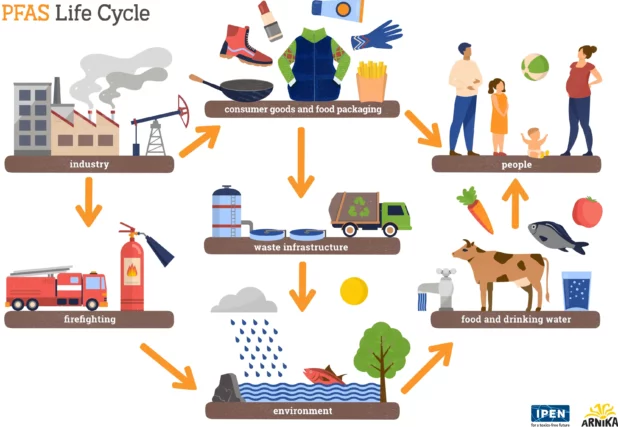“Outdoor clothing” is made of plastic, so presumably, 100% of it has penis-shrinking chemicals.
But this “water resistant” shit is much worse.
Hikers may be inadvertently damaging the environment and risking their own health by wearing clothes made waterproof with “forever chemicals”, according to research by Ethical Consumer.
The campaigning magazine examined 27 companies that make outdoor clothing such as fleeces, waterproof jackets, walking boots and rucksacks, and found 82% were still using per- and polyfluoroalkyl substances, or PFAS.
Some chemicals classed as PFAS have been linked to health problems including high cholesterol, fertility, immune system disorders and some cancers. They have been used in consumer products since the 1950s and can take hundreds of years to degrade, contaminating the soil and water supply.
The government said in February that it was considering restricting the use of PFAS in consumer products under the UK’s REACH chemical regulations on the basis that they may be hazardous. Yet there are alternatives. Páramo and Finisterre use no PFAS in their products, while Fjällräven, Alpkit, Lowe Alpine and Patagonia are mostly PFAS free. They and more than a dozen other firms say they will end their PFAS use next year.
But nearly half of the companies assessed by Ethical Consumer had no phase-out date for using PFAS.
Jane Turner, an Ethical Consumer writer and researcher, said: “The irreversible global contamination and extreme toxicity of ‘forever chemicals’ have been undisputed for years, but most outdoor clothing companies are still unnecessarily using them and adding to the PFAS pollution burden. That’s not acceptable, and companies must stop using them now. Consumers should only buy from the responsible companies that have stopped using PFAS.”
There are more than 10,000 PFAS chemicals, according to Fidra, an environmental charity aiming to reduce plastic waste and chemical pollution. Those used in outdoor gear help fabrics repel water, making the liquid slide off.
The process of weathering the material means that hikers wearing outdoor gear shed some of the chemicals into the environment, although most PFAS pollution occurs during the manufacture of the chemicals, when they are applied to fabric, and when a product is thrown away.
I’m at the point where I won’t even wear 100% T-shirts that have logos on them, as the logo is made of plastic and that turns into microplastic in the washer-drier.
Of course, T-shirts with things written on them are gay.
I’ve tried to buy some of this “organic clothing,” but it’s hard for me to find stuff that fits correctly, and I think the dyes in clothing are not that big of a deal.


